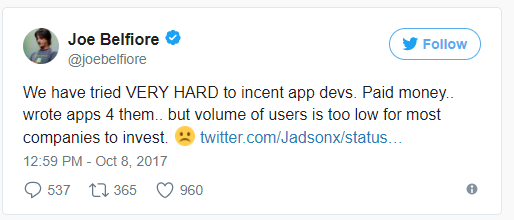
Facebook and Twitter are fighting for the hearts and minds of social media users. As Facebook struggles with “fake news” and changes their algorithms (hurting some legitimate sites in the process), Twitter is using this moment to embrace the press… but will anything improve?
Amazon has purchased another home camera company. It was announced they purchased Ring (a video doorbell maker) after purchasing Blink in December. Amazon really wants to find away to make customers comfortable with letting them into their homes…
On the Amazon topic, they are in a race with Apple to become the first company to be worth a trillion dollars…
Acquisitions
- Amazon Acquires Ring, Maker of Video Doorbells
Amazon.com Inc. acquired Ring, maker of video doorbells, in a deal valued at more than $1 billion, a person familiar with the transaction said, giving the online giant a bigger foothold in the burgeoning internet business of home security.
https://www.wsj.com/articles/amazon-acquires-ring-maker-of-video-doorbells-1519768639
- Nokia acquires Unium, a mesh WiFi startup that works with Google Fiber, as part of big home WiFi push
While Nokia’s former handset business forges ahead with its new device strategy under licensee HMD, Nokia itself has taken one more step to build out its business with carriers in a new wave of services. To coincide with MWC in Barcelona and a bigger step into the WiFi business, the company today announced that it has acquired Unium, a startup out of Seattle that builds technology for mesh WiFi for home networking services.
Unium’s tech is used to address one of the biggest pain-points in home WiFi today: it helps fill in dead spots in home WiFi arrangements, where you may not get signal or interference from other networks, and the accompanying security issues that might come alongside those.
Artificial Intelligence
- The Future of Policing Is Being Hashed Out in Secret (thanks JD)
It should go without saying that experimenting with predictive AI in real-world law enforcement demands public oversight and awareness. The debate that is now beginning should have been had before the technology was used to build indictments, not afterward. Nevertheless, it would also be a mistake if the only outrage is over the failure to make public disclosures. The more important conversation must address the deeper issues this case raises.
Law enforcement — and criminal justice more broadly — must be evaluated on two separate criteria: pragmatic effectiveness and legal justice. On the first criterion, it’s important to note that there isn’t yet any clear evidence that the Palantir-New Orleans partnership works. Palantir would like to take credit for a New Orleans crime dip, but the data and the timing don’t necessarily support that. For now, the efficacy of machine-based crime prediction and protection must be treated as unproven at best.
- Amazon vs. Google vs. Microsoft: Big tech firms gird for AI talent battle
As Quartz points points out, top AI talent is scarce “and companies are willing to pay millions to obtain new talent.” A case-in-point, Google paid more than $500 million in 2014 for UK-based AI startup DeepMind. And we’ll see millions more paid for AI startups, scientists and engineers as the talent war heats up.
Separately, Microsoft’s Cortana has a new boss. Javier Soltero, who formerly worked on Office will now be in charge of Cortana. He’ll report to Harry Shum, who’s the head of AI for the company.
https://martechtoday.com/amazon-vs-google-vs-microsoft-big-tech-firms-gird-ai-talent-battle-211894
They went with “gird” in the headline, I wonder if AI wrote it.
Cloud
- The Best Thing for Dropbox Was Breaking Up With the Cloud
Those paragraphs in the public offering document (page 67) summarize the difficult and nerdy work to shift a vast volume of Dropbox users’ digital files from Amazon’s computer networks to Dropbox’s own and to close dormant accounts to free up storage capacity. This yearslong shift to wean Dropbox off Amazon Web Services wasn’t glamorous work, but it improved Dropbox’s finances substantially. Without exaggeration, the shift away from cloud computing is one of the biggest reasons Dropbox is able to go public now.
- Nasty, new security threats are scaring .govs to the cloud
“I believe that the leadership within the government is ready for this change,” Wood said. AWS’ Commercial Cloud Services, or C2S, and Secret Commercial Cloud Service, or SC2S, are the “secret” and “top secret” clouds, respectively, Wood explained. The intelligence community — including its military components — have been working together to assess the security features of these clouds. The group of 38 assessors clearly see the benefits and are gaining confidence that the data is protected and are now closer to reciprocity than ever before.
A common vernacular for cybersecurity pros has hurt attempts to build expertise and strong security standards and systems in the past. The signing of the president’s executive order on cybersecurity is now mandating the adoption of the NIST Cybersecurity Framework.
- Apple may no longer be using Microsoft’s Azure
The updated Apple security guide now lists Amazon’s S3 and the Google Cloud Platform as where some encrypted “chunks” of files are stored. Apple’s iCloud stores users’ contacts, calendars, photos and documents, among other types of information. iCloud also is used by some third-party apps to store and sync documents and key values for app data, Apple’s security guide notes.
CRN reported in March 2016 that Google signed on Apple as a customer for the Google Cloud platform, citing “multiple sources with knowledge of the matter.” At that time, CRN also reported that Apple had “significantly reduced its reliance on Amazon Web Services,” though had not abandoned AWS entirely.
http://www.zdnet.com/article/apple-may-no-longer-be-using-microsofts-azure/
Interesting timing to reduce reliance on AWS as both companies race to be the first one trillion dollar company.
Security
- Equifax finds another 2.4 million people affected by its data breach
“This is not about newly discovered stolen data,” Paulino do Rego Barros, Jr., Equifax’s Interim CEO, said in a statement. “It’s about sifting through the previously identified stolen data, analyzing other information in our databases that was not taken by the attackers and making connections that enabled us to identify additional individuals.” Equifax said that because the attackers appeared to be focused on obtaining social security numbers, that’s what their investigation centered on during its initial phases. These additional 2.4 million individuals didn’t have their social security numbers stolen and were therefore not spotted earlier in the investigation.
https://www.engadget.com/2018/03/01/equifax-2-4-million-more-people-affected-data-breach/
- Apple to Start Putting Sensitive Encryption Keys in China
The keys are complex strings of random characters that can unlock the photos, notes and messages that users store in iCloud. Until now, Apple has stored the codes only in the U.S. for all global users, the company said, in keeping with its emphasis on customer privacy and security.
While Apple says it will ensure that the keys are protected in China, some privacy experts and former Apple security employees worry that moving the keys to China makes them more vulnerable to seizure by a government with a record of censorship and political suppression.
“Once the keys are there, they can’t necessarily pull out and take those keys because the server could be seized by the Chinese government,” said Matthew Green, a professor of cryptography at Johns Hopkins University. Ultimately, he says, “It means that Apple can’t say no.”
https://www.wsj.com/articles/apple-to-start-putting-sensitive-encryption-keys-in-china-1519497574
- GitHub survives massive DDoS attack relatively unscathed
GitHub, a web-based code distribution and version control service, survived a massive denial of service attack on Wednesday. According to a report at Wired, a staggering 1.35 terabits per second (Tbps) of traffic hit the site at once. Within 10 minutes the company called for help from a DDoS mitigation service similar to Google’s Project Shield, Akamai’s Prolexic, which took over to filter and weed out malicious traffic packets. The attack, says Wired, ended after eight minutes. This may have been the largest DDoS attack ever; Wired notes the attack on domain name server Dyn in late 2016 reached 1.2 Tbps of traffic.
https://www.engadget.com/2018/03/01/github-survives-massive-ddos-attack-relatively-unscathed/
Software/SaaS
- LittleThings blames its shutdown on Facebook algorithm change
Then Facebook made another big change to its algorithm, one that was supposed to prioritize content from friends and family over news publishers. Speiser said this cut LittleThings’ influencer and organic traffic (which was its most valuable traffic) by 75 percent.
“No previous algorithm update ever came close to this level of decimation,” he wrote. “The position it put us in was beyond dire. The businesses looking to acquire LittleThings got spooked and promptly exited the sale process, leaving us in jeopardy of our bank debt convenants and ultimately bringing an expedited end to our incredible story.”
https://techcrunch.com/2018/02/28/littlethings-shutdown/?ncid=rss
This is what happens when you base a business model completely on a platform you don’t own or control. - While Facebook spars with critics, Twitter goes for humility on social media
Twitter’s smaller size relative to Facebook also may help it repair its image because it’s not as dominant as Facebook. The media and marketing community is also eager for platform allies to counter Facebook and Google’s enormity, and Twitter has given the impression it wants to get out ahead of the trolls, bots and other abuses of its service. But as with Facebook, Twitter is vulnerable for having let the abuse problem continue as long as it has, and the PR goodwill will only last so long. It also has a chance to get out ahead of its role being spotlighted in probes of Russia’s meddling in the run-up to the U.S. presidential election in 2016.
To one publishing executive, Dorsey came off as “sincere, not defensive. But they have to actually do something. Talk is cheap. If they want to become a credible publishing entity, they need to take responsibility. And that means action.”
https://digiday.com/media/facebook-spars-critics-twitter-goes-humility-social-media/
Other
- Apple Is Going to Be the First Trillion-Dollar Company
Apple’s board of directors had most recently authorized a $210 billion share-repurchase program that is expected to be completed by March 2019, according to Apple investor relations. That was before the very corporate friendly 2017 tax reform bill was passed. I would expect that bill will encourage even more share repurchases. We should not be surprised to see a 10 or even 20 percent share count reduction over the next five years.
- IBM gives Services staff until 2019 to get agile
IBM has spent years telling the world that its Notes suite is as fine a collaboration environment as there is to be found anywhere, if only you’d give it a chance and appreciate its charms. But among the changes required to demonstrate agility is cessation of email use in favour of devops darling Slack. Staff are also expected to start using WebEx.
Come September 30, IBM wants its services staff to have hit level-three agility maturity, and to see “positive trending of agile metrics.” Come December 30, Big Blue wants “continuous improvement leading to client advocacy.”
https://www.theregister.co.uk/2018/02/26/ibm_gives_services_staff_until_2019_to_get_agile/
IBM report, “Who Says Elephants Can’t Dance?”“There’s been a feeling historically that the elephants can’t dance, the incumbents will find it hard to respond and that everyone will be Uber-ed or Airbnb-ed out of existence,” Mark Foster, senior vice president of IBM Global Business Services, told Reuters in an interview.
“But what we are seeing is, actually, there is a limit as to how far that can go.”
While some sectors had been hugely disrupted by new digital entrants and some intermediaries were pushed out, many of those changes were now being led by existing industry players, he said.
https://www.aljazeera.com/news/2018/02/ibm-report-elephants-dance-180225153412288.html
- How SoftBank, World’s Biggest Tech Investor, Throws Around Its Cash
They describe a man who sometimes makes gut-instinct decisions in businesses he knows little about—such as the time he spent about 30 minutes deciding he wanted to invest $200 million in a startup that grows vegetables indoors. Other times, he compiles an elaborate analysis, inundating his directors with hundreds of pages of documents to help explain an investment target.
To strike quickly, he sometimes commits to investments before getting approval from his fund’s investment committee, some of these people say. And he often spars with his executives and board members over his proposals until they are convinced or acquiesce.
Photo: Kevin Stoop


















